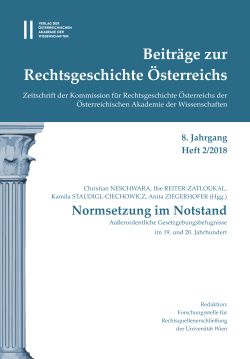|
 |
Thomas OLECHOWSKI, Wien
Normsetzung im Notstand. Zur Einführung
Christian NESCHWARA, Wien
Gesetzgebungsbefugnisse der Exekutive im Verfassungsstaat
Notverordnungsrechte im Kaisertum Österreich von 1848 bis 1867
Helmut GEBHARDT, Graz
Die Praxis des § 14-Notverordnungsrechts von 1868 bis 1914
Anita ZIEGERHOFER, Graz
Die zweite Hochblüte des § 14
Die Zeit während des Ersten Weltkrieges in der österreichischen Reichshälfte
Kamila STAUDIGL-CIECHOWICZ, Wien
Das Kriegswirtschaftliche Ermächtigungsgesetz 1917
Von seiner Entstehung 1917 bis zu seiner Aufhebung 1946
Ilse REITER-ZATLOUKAL, Wien
Von der Demokratie zur Diktatur
Das Kriegswirtschaftliche Ermächtigungsgesetz in der Ersten Republik
Gerald KOHL, Wien
Die außerordentliche Gesetzgebung im Rahmen der Genfer Protokolle
Theorie und Praxis des „außerordentlichen Kabinettsrates“ 1922–1924
Martin F. POLASCHEK, Graz
Das KwEG als Wegbereiter des autoritären Ständestaates
Stephan G. HINGHOFER-SZALKAY, Graz
Richterliche Rechtsnormvernichtung im Notstand
Verfassungsgerichtsbarkeit und Notverordnung
Helmut WOHNOUT, Wien
Das Ermächtigungsgesetz 1934 und seine Handhabung im autoritären Österreich
Ewald WIEDERIN, Wien
Das Notverordnungsrecht des Bundespräsidenten
Christoph GUSY, Bielefeld
Ermächtigungsgesetzgebung in Deutschland zwischen Monarchie und Republik
Thomas KRÖLL, Wien
Il Governo legislatore –
Regierungsgesetzgebung im Königreich Italien (1848–1922–1943)
Marcin KWIECIEŃ, Krakau
Ausnahmezustände im Rechtssystem der II. Polnischen Republik
Jaromír TAUCHEN, Brünn
Ermächtigungsgesetzgebung in der Tschechoslowakei
Attila BARNA, Győr
Im Wendekreis von Notstand und Ausnahmsgewalt
Politische Umbruchszeiten und außerordentliche Normsetzungsbefugnisse
in Ungarn am Beginn des 20. Jahrhunderts
Airton SEELAENDER, Brasília
Zwischen Gesetzeskraft und Verfassungswidrigkeit
Die Verordnungen der revolutionären „provisorischen Regierung“
(1930–1934) und der Streit um ihre Bedeutung für die brasilianische Rechtsordnung
|



